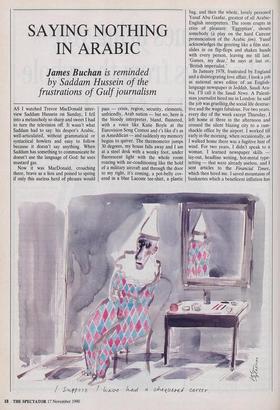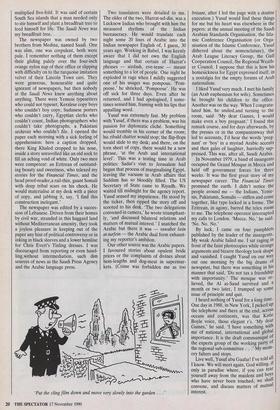SAYING NOTHING IN ARABIC
James Buchan is reminded by Saddam Hussein of the frustrations of Gulf journalism
AS I watched Trevor MacDonald inter- view Saddam Hussein on Sunday, I fell into a melancholy so sharp and sweet I had to turn the television off. It wasn't what Saddam had to say: his despot's Arabic, well-articulated, without grammatical or syntactical howlers and easy to follow because it doesn't say anything. When Saddam has something to communicate he doesn't use the language of God: he uses mustard gas.
Now it was MacDonald, crouching there, brave as a lion and poised to spring if only this useless herd of phrases would pass — crisis, region, security, elements, unfriendly, Arab nation — but no, here is the bloody interpreter, bland, flustered, with a voice like Katie Boyle at the Eurovision Song Contest and r's like d's as in Ameddican — and suddenly my memory begins to quiver. The thermometer jumps 30 degrees, my house falls away and I am at a steel desk with a wonky foot, under fluorescent light with the whole room roaring with air-conditioning like the hold of a military aircraft and through the door to my right, it's coming, a pot-belly cov- ered in a blue Lacoste tee-shirt, a plastic bag, and then the whole, lovely personof Yusuf Abu Gaafar, greatest of all Arabic- English interpreters. The room erupts in cries of pleasure: `Eggyptian', shouts somebody (a play on the hard Cairene pronunciation of the Arabic jim), Yusuf acknowledges the greeting like a film star, slides in on flip-flops and shakes hands with every person, leaving me till last. `Games, my dear,' he says at last or, `British imperialist.'
In January 1978, frustrated by England and a disintegrating love affair, I took a job as national news editor of an English- language newspaper in Jeddah, Saudi Ara- bia. I'll call it the Saudi News. A Palesti- nian journalist hired me in London: he said the job was gruelling,the social life destruc- tive and the wages fabulous. For two years, every day of the week except Thursday, I left home at three in the afternoon and crossed the silent blazing city to a ram- shackle office by the airport. I worked till early in the morning, when occasionally, as I walked home there was a fugitive hint of wind. For two years, I didn't speak to a woman. I learned newspaper skills — lay-out, headline writing, hot-metal type- setting — that were already useless, and I sent articles to the Financial Times, which then hired me. I saved mountains of banknotes which a beneficent inflation has multiplied five-fold. It was said of certain South Sea islands that a man needed only to stir himself and plant a breadfruit tree to feed himself for life. The Saudi News was my breadfruit tree.
The newspaper was owned by two brothers from Medina, named Saadi. One was slim, one was corpulent, both were pale. I remember nothing of them except their gliding palely over the four-inch orange nylon nap of their office or slipping with difficulty on to the turquoise imitation velvet of their Lincoln Town cars. They were generous, honourable and quite ignorant of newspapers, but then nobody at the Saudi News knew anything about anything. There were Yemeni typesetters who could not typeset, Keralese copy boys who couldn't boy copy, Sudanese porters who couldn't carry, Egyptian clerks who couldn't count, Indian photographers who couldn't take photographs, a Pakistani archivist who couldn't file. I opened the paper each morning with a sick feeling of apprehension: here a caption dropped, there King Khaled cropped to his nose, inside a story unravelled like an old sock to fill an aching void of white. Only two men were competent: an Eritrean of outstand- ing beauty and sweetness, who telexed my stories for the Financial Times, and the head proof-reader,a rail-thin, gaunt Somali with deep tribal scars on his cheek. He would materialise at my desk with a piece of copy, and jabbing it, say, 'I find this construction inelegant.'
The newspaper was edited by a succes- sion of Lebanese. Driven from their homes by civil war, stranded in this haggard land without Mediterranean amenity, they took a joyless pleasure in keeping out of the paper any hint of political controversy or in inking in black sleeves and a lower hemline for Chris Evert's Tinling dresses. I was discouraged from reporting or even hand- ling,without intermediation, such dim sources of news as the Saudi Press Agency and the Arabic language press. Two translators were detailed to me. The older of the two, Huzrat-ud-din, was a Lucknow Indian who brought with him the measured rhythms of the Indian bureaucracy. He would translate each night some 20 lines of Arabic into the Indian newspaper English of, I guess, 30 years ago. Working in Babel, I was keenly aware that I did not own the English language and that certain of Huzrat's phrases — airdash, eve-tease — meant something to a lot of people. One night he exploded in rage when I mildly suggested one of his usages was pompous. 'Pom- poose,' he shrieked, 'Pompoose'. He was off sick for three days. Even after he returned, and I had apologised, I some- times sensed him, framing with his lips that appalling word.
Yusuf was extremely fast. My problem with Yusuf, if there was a problem, was his passion for diplomatic cliché. Something would tremble in his corner of the room; his ribald chatter would stop; the flip-flops would slide to my desk; and there, on the torn sheet of copy, there would be a new phrase, 'at the Arab and international level'. This was a testing time in Arab politics: Sadat's visit to Jerusalem had begun that process of marginalising Egypt, leaving the vacuum in Arab affairs that Saddam has so bloodily filled. The US Secretary of State came to Riyadh. We waited till midnight for the agency report. Yusuf sensed my impatience. He stood by the ticker, then ripped the story off and scooted to his desk. 'The two delegations convened in camera,' he wrote triumphant- ly, 'and discussed bilateral relations and matters of mutual interest.' I snatched the Arabic but there it was — rawabet bein at-turfein — the Arabic dual form exhaust- ing my reporter's ambiton.
Our other source was the Arabic papers. I favoured stories about opulent bride prices or the complaints of divines about hem-lengths and dog-meat in supermar- kets. (Crime was forbidden me as too Tut the cling film down and move very slowly into the garden . . brisant, after I led the page with a double execution.) Yusuf would find these things for me but his heart was elsewhere in the papers: at the annual meeting of the Saudi Arabian Standards Organisation, the Isla- mic Conference Organisation (or Orga- nisation of the Islamic Conference, Yusuf dithered about the nomenclature), the Arab League Literacy Group, the Gulf Cooperation Council, the Regional Weath- er Council. I suppose that this is how his homesickness for Egypt expressed itself, in a nostalgia for the empty forums of Arab nationalism.
I liked Yusuf very much. I met his family (an Arab euphemism for wife). Sometimes he brought his children to the office. Another was on the way. When I congratu- lated him, he smiled,and turning to the room, said: 'My dear Games, I would make even a boy pregnant.' I found this remark coarse, and for days afterwards, by the presses or in the companionway that led to accounts, I'd hear the words 'preg- nant' or 'boy' in a myriad Arabic accents and then gales of laughter, hurriedly sup- pressed. This was, after all, Saudi Arabia.
In November 1979, a band of insurgents occupied the Grand Mosque in Mecca and held off government forces for three weeks. It was the first great story of my newspaper career. The Financial Times promised the earth. I didn't notice the people around me — the Indians, Yeme- nis, Pakistanis, Somalis — stiffen and come together, like type locked in a forme. The Eritrean, in agony, barred the telex room to me. The telephone operator interrupted my calls to London. 'Mecca. No,' he said. `No. No. No.'
By luck, I came on four pamphlets published by the leader of the insurgents. My weak Arabic failed me. I sat raging in front of the faint photocopies while strange arguments and bizarre theology took shape and vanished. I caught Yusuf on our way out one morning by the big drums of newsprint, but there was something in his manner that said, 'Do not tax a friendship with importunity.' The mosque was re- lieved, the Al as-Saud survived and a month or two later, I trumped up some issue of principle and quit.
I heard nothing of Yusuf for a long time. One day in 1988, in New York, I picked uP the telephone and there at the end, across oceans and continents, was that Katie Boyle voice, those elegant es. 'My dear Games,' he said. 'I have something with me of national, international and global importance. It is the draft communiqué of the experts group of the working party of the regional sub-committee . . My mem- ory falters and stops. Live well, Yusuf abu Gaafarl I've told all I know. We will meet again, God willing, if only in paradise where, if you can tear yourself away from the maidens and boys who have never been touched, we shall convene, and discuss matters of mutual interest.
























































 Previous page
Previous page